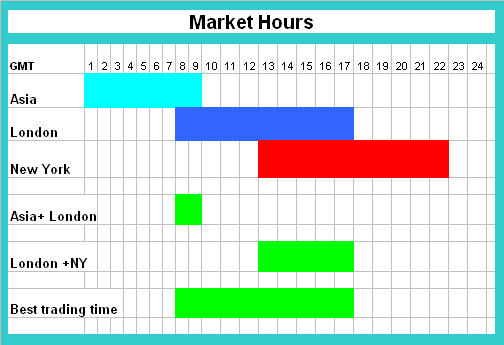Commodities Trading Market Hours and The 3 Major Commodity Trading Sessions
New York Close Charts
To maximize the number of trading opportunities during these Commodity Trading hours, it is important to be aware of the times when the commodity market is busiest. This is the time that most commodity transaction activity occurs.
Even though there is no official open and close time during the week, it can be broken up into 3 major Commodity Trading sessions - Tokyo, London & New York sessions.
However, although it seems not to be very important at the beginning, the right time to trade is one of the most crucial points required to be a successful trader.
The best time is when the commodity market is most active and therefore has the biggest volume of transactions. A more active market creates a good chance to make some profit while a calm and slow one is literally a waste of time - turn off your computer and don't even bother trading commodity at this time.
Not all the times are suitable, that is because the volatility keeps changing. Below is a table outlining the schedule of Commodity Trading Market Sessions. The time used is GMT 0

The 3 major sessions are:
- Asian Session Hours( Tokyo ): 00:00 - 9:00 GMT
- European Session Hours( London ): 7:00 - 17:00 GMT
- U.S. Market Session Hours( New York ): 13:00 - 22:00 GMT
Commodity Trading Sessions Overlaps
There are hours when 2 sessions are overlapped:
London + Tokyo overlap - 7:00 - 9:00 GMT
New York + London overlap - 13:00 - 17:00 GMT
At these overlapping market hours you will find the highest volume of commodity transactions and therefore more chances to win during these hours.
This means that the lion share of commodity transactions is happening between the London session and US sessions. Naturally this is the best time to make profits.
The commodities prices moves a lot during the New York & London Market Sessions because Multinational companies, hedge funds, managed funds & banks are open for transacting.
Multinationals will transact commodity instruments during this time to facilitate international business transactions and commerce, hedge funds and managed funds will trade commodity instruments for investment purposes, banks on the other hand will exchange a lot of money on behalf of their clients, maybe tourists wanting to travel around the globe or just anyone wanting to exchange money so as to buy something in another country or make some transaction.
This makes the commodity market very liquid at this time and the high volume of transactions means that commodities prices move a lot. At this time the commodities charts will generally move in particular direction & form a short term trend.
As a trader you also want to join in when everyone is placing their commodity orders as this is the time there is enough liquidity and many good opportunities to make money, and because there is a lot of liquidity the commodities trading price movement will generally be more predictable unlike when there is little liquidity and the commodities trading price movement becomes unpredictable and the commodities prices can move in a range bound with no particular direction.
Once you trade commodity trading for a while you will get to know that is easier to make money when the commodity market is moving up or moving down, unlike when it is in a range.
Asian Session Characteristics:
- Least volatile of the three marketmarket sessions
- Account for 15% of daily transaction turnover
- Typical 20 -30 pip moves
European Session Characteristics:
- Most volatile of the three marketmarket sessions
- 35% of daily transaction volume
- Typical 90 -150 pip moves
US Session Characteristics:
- 2nd most volatile of the three marketmarket sessions
- Accounts for 25% of daily turnover
- Focuses on US economic news
US and Europe Session Overlaps Characteristics:
- Combines the two most volatile trading sessions
- Accounts for 60% of total daily transaction turnover
- Focuses on USA and European economic news
- Fast moving commodities trading prices and commodity instrument trends in a particular direction
- Typical 100 -150 pip moves for major commodities trading instruments
